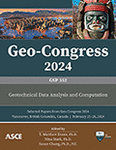A Deep Learning Model to Evaluate Cracks in the Underground Structure of New Domains
Publication: Geo-Congress 2024
ABSTRACT
Numerous studies are currently underway to investigate the safety management and evaluation of underground structures, as they require continuous management beyond their initial construction. Although such structures are regularly evaluated in accordance with safety regulations, measurements of degradation factors are typically performed manually by workers. To improve this process, many researchers have turned to computer vision, which offers an objective and automated method for evaluation. However, the performance of many deep learning models in this field is heavily dependent on training data, which may hinder their effectiveness in new domains. To address this issue, this study proposes a new method for detecting cracks on the surface of concrete underground structures based on computer vision. The proposed method achieves high performance with small additional labeling processes by utilizing both labeled and unlabeled datasets from the new domain. The results show that it contributes to objective and effective management with small additional processes in new domains.
Get full access to this article
View all available purchase options and get full access to this chapter.
REFERENCES
Choi, W., and Cha, Y.-J. (2019). “SDDNet: Real-time crack segmentation.” IEEE Transactions on Industrial Electronics, 67(9), 8016–8025.
Farahani, A., Voghoei, S., Rasheed, K., and Arabnia, H. R. (2021). “A brief review of domain adaptation.” Advances in data science and information engineering: proceedings from ICDATA 2020 and IKE 2020, 877–894.
Fawcett, T. (2006). “An introduction to ROC analysis.” Pattern recognition letters, 27(8), 861–874.
Kim, J., Shim, S., Cha, Y., and Cho, G.-C. (2021). “Lightweight pixel-wise segmentation for efficient concrete crack detection using hierarchical convolutional neural network.” Smart Materials and Structures, 30(4), 045023.
Kulkarni, S., Singh, S., Balakrishnan, D., Sharma, S., Devunuri, S., and Korlapati, S. C. R. “CrackSeg9k: A Collection and Benchmark for Crack Segmentation Datasets and Frameworks.” Proc., Computer Vision–ECCV 2022 Workshops: Tel Aviv, Israel, October 23–27, 2022, Proceedings, Part VII, Springer, 179–195.
Liu, J., Zhou, Q., Qiang, Y., Kang, B., Wu, X., and Zheng, B. “FDDWNet: a lightweight convolutional neural network for real-time semantic segmentation.” Proc., ICASSP 2020-2020 IEEE International Conference on Acoustics, Speech and Signal Processing (ICASSP), IEEE, 2373–2377.
Long, J., Shelhamer, E., and Darrell, T. “Fully convolutional networks for semantic segmentation.” Proc., Proceedings of the IEEE conference on computer vision and pattern recognition, 3431–3440.
Maguire, M., Dorafshan, S., and Thomas, R. J. (2018). SDNET2018: A concrete crack image dataset for machine learning applications.
Morgenthal, G., and Hallermann, N. (2014). “Quality assessment of unmanned aerial vehicle (UAV) based visual inspection of structures.” Advances in Structural Engineering, 17(3), 289–302.
Özgenel, Ç. F., and Sorguç, A. G. “Performance comparison of pretrained convolutional neural networks on crack detection in buildings.” Proc., Isarc. proceedings of the international symposium on automation and robotics in construction, IAARC Publications, 1–8.
Romera, E., Alvarez, J. M., Bergasa, L. M., and Arroyo, R. (2017). “Erfnet: Efficient residual factorized convnet for real-time semantic segmentation.” IEEE Transactions on Intelligent Transportation Systems, 19(1), 263–272.
Zhu, Y., Zhang, Z., Wu, C., Zhang, Z., He, T., Zhang, H., Manmatha, R., Li, M., and Smola, A. (2021). “Improving semantic segmentation via self-training. arXiv 2020.”.
Information & Authors
Information
Published In
History
Published online: Feb 22, 2024
ASCE Technical Topics:
- Artificial intelligence and machine learning
- Business management
- Computer programming
- Computing in civil engineering
- Construction engineering
- Construction management
- Continuous structures
- Continuum mechanics
- Cracking
- Design (by type)
- Drop structures
- Engineering fundamentals
- Engineering mechanics
- Fracture mechanics
- Neural networks
- Occupational safety
- Practice and Profession
- Public administration
- Public health and safety
- Safety
- Solid mechanics
- Special condition construction
- Structural design
- Structural engineering
- Structural safety
- Structures (by type)
- Underground construction
- Underground structures
Authors
Metrics & Citations
Metrics
Citations
Download citation
If you have the appropriate software installed, you can download article citation data to the citation manager of your choice. Simply select your manager software from the list below and click Download.
